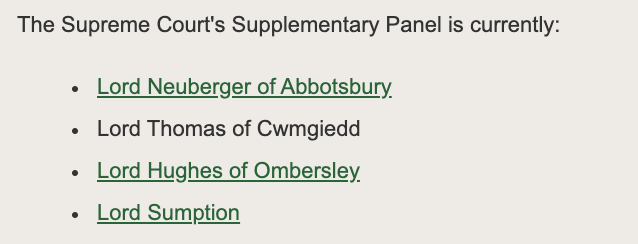From today the criminal law imposes the "rule of 6" on everbody in society. Some initial thoughts on the problematic nature and context of this rule and why it needs to be given very close scrutiny in Parliament and a better solution found [Thread]
Let& #39;s start with the fact that - rightly or wrongly - we are at a point where many people in society will have understandable questions as to the attitude they are supposed to adopt to compliance with such regulations. Why? First, consider the messages:
Let& #39;s start with 24 May when The Prime Minister excused Dominic Cummings& #39; trip to Durham and Barnard Castle on the basis that he exercised his judgement and acted responsibly:
Different context of course, but we also have the statement on 8 September by Brandon Lewis that the UK Government considers that a "specific and limited" breach of international law would be justified.
Then on 14 September 2020 a current Member of the Supreme Court& #39;s Supplementary Panel was asked on the Today programme (2:21:00) if he would encourage people to flout the rule of 6. He responded that people should use their judgement and the law is a secondary consideration.
This was not a surprise: Lord Sumption previously acknlowledged very frankly that he stopped complying with the lockdown laws when in his view they became absurd.
Yet also on today& #39;s Today programme (1:13:10) the Minister for Crime and Policing was asked whether people should report their next-door-neighbours to the police if they see them with 7 people in their garden. He gave a straight answer "yes".
And we have the prospect of Covid marshalls on the streets to identify transgressions.
These are conflicting messages.
It is not my purpose here to assess or criticise any of these positions.
The point is that this is the context in which the rule of 6 enters our law.
It is not my purpose here to assess or criticise any of these positions.
The point is that this is the context in which the rule of 6 enters our law.
This issue is not helped by the fact that the rule of 6 is directed at private life and social relations which requires self-policing to a very large extent. That - as everyone knows - engages individual responsibility.
It is also not helped by the fact that the rule of 6 does produce results that seem to depart from its public health rationale and it certainly imposes heavier burdens on some (esp large families) than others.
It is difficult to understand for example why if family A is able to see the grandparents family B cannot do so.
It will be difficult for people to understand why if G spends all day with her friends at school it should be a criminal offence for her to see them after school.
It will be difficult for people to understand why if G spends all day with her friends at school it should be a criminal offence for her to see them after school.
And it is difficult to understand why 6 friends from 6 different households can meet in the pub but lunch between 2 households of 4 is a criminal offence.
All of this gives rise to an unsatisfactory situation.
- Resentment from people who comply with the law against those who do not.
- Uncertainty as to one& #39;s moral obligations.
- The authority of the law being questioned and respect for the law being eroded.
- Resentment from people who comply with the law against those who do not.
- Uncertainty as to one& #39;s moral obligations.
- The authority of the law being questioned and respect for the law being eroded.
These concerns are fuelled by the fact that (a) as far as I know the rule of 6 has not been fully explained, (b) it came into effect without approval from Parliament, and (c) it does not apply outdoors in Wales.
And recall that on 23 June the PM informed Parliament that in the future the Gov would proceed entirely on the basis of guidance not criminal laws:
For these and other reasons I think Parliament needs to look very closely indeed at the rule of 6 and seek to find a different less intrusive solution.
To be clear, I am *not* suggesting that people should not try to work out what the law requires of them and comply with it. I am making a case for changing the law.

 Read on Twitter
Read on Twitter






